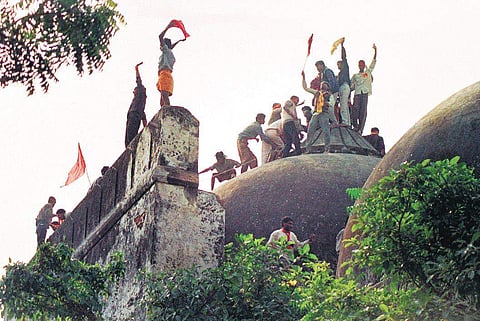

NEW DELHI: The decades-old religious dispute at Ayodhya came to a conclusion with the SC’s verdict on Saturday.
The case was about a disputed piece of land in the Ayodhya where Lord Ram was believed to be born and for 29 years after the Babri Masjid demolition, the case of the title suit has been driving the politics of the country in some way or the other.
The roots of the dispute date back to 1528 when Babur, the first Mughal emperor, built the Babri Masjid on the site where Lord Ram was believed to be born and that there had already been a temple there.
However, the case came to the Courts for the first time in 1885 as Mahant Raghubir Das filed a plea in Faizabad district court seeking permission to build a canopy of Ram Chabootra on the site of Ram Janmabhoomi which was rejected.
Thereafter, the first big controversy in the Ayodhya conflict came in 1949 when an idol of Lord Ram was allegedly placed inside the mosque by Hindu activists and a message was spread that Lord Ram had miraculously appeared inside the mosque.
Gates locked
The Muslims protested, and both parties filed civil suits. The government proclaimed the premises a disputed area and locked the gates.
In 1950, puja was allowed but inner courtyard gates were locked. Cases were filed in the court by the Hindu side seeking permission for the right to worship the idol in the premises.
The court held back the removal of the idol and allowed the Hindus to worship.
The Nirmohi Akhara became a party to the dispute in 1959 and the Sunni Wakf Board joined in 1961.
Political turn
However, the issue took centerstage and become more a political one as right-wing outfits including Vishwa Hindu Parishad (VHP) started a nationwide movement claiming the land as Ram Janmbhoomi.
VHP heightened its campaign and laid the foundation of the Ram temple alongside the Babri mosque in 1989 and taking it further in 1990 volunteers damaged the mosque partially.
Then-Prime Minister Chandra Shekhar intervened and tried to resolve the matter through negotiations between the two communities but could not succeed. BJP came to power in the state of Uttar Pradesh in 1991 and one year later in 1992, the Hindu karsevaks and supporters of VHP, and the BJP demolished the Babri Masjid leading to nationwide communal riots between the Hindus and Muslims.
ASI survey
In the meantime, in 2003, the Archaeological Survey of India (ASI) began a court-ordered survey to find out whether a Ram temple existed at the disputed site and found evidence of a temple which Muslims objected to.During August 2003, the survey said about evidence of a temple beneath the mosque, but Muslims disputes the findings. Then-Prime Minister Atal Bihari Vajpayee said at the funeral of Hindu activist Ramchandra Das Paramhans that he would fulfil the dying man’s wishes and build a temple at Ayodhya. He also hoped the courts and negotiations will solve the issue.
High Court division
The Allahabad High Court decreed the division and transfer of title in three equal parts of the 2.77 acres of the disputed land to three principal claimants, one-third to Muslims, Hindus another third and the remainder to the Nirmohi Akhara sect in 2010.
However, Hindus got the main disputed section of the land which Muslims objected to and filed an appeal against in the court of law. The Supreme Court finally disposed of the appeals on November 9, 2019.
Demand for temple never ceased
VHP pledged to build the temple again at the disputed land on the anniversary of Babri Masjid’s demolition in the year 2001
The legal battle
Sep 30, 2010
HC, in a 2:1 majority, rules three-way division of disputed area between Sunni Wakf Board, the Nirmohi Akhara and Ram Lalla.
May 9, 2011
SC stays HC verdict on Ayodhya land dispute.
Mar 21, 2017
CJI JS Khehar suggests out-of-court settlement among parties.
Aug 7, 2017
SC constitutes three-judge bench to hear pleas challenging 1994 Allahabad HC verdict.
Feb 8, 2018
SC starts hearing the civil appeals.
Sep 27, 2018
SC declines to refer the case to a five-judge Constitution bench. Case to be heard by a newly constituted three-judge bench.
Dec 24, 2018
SC decides to take up petitions on case for hearing on January 4, 2019.
Jan 8, 2019
SC sets up a five-judge Constitution Bench to hear the case headed by Chief Justice Ranjan Gogoi and comprising justices S A Bobde, N V Ramana, U U Lalit and D Y Chandrachud.
Jan 10, 2019
Justice U U Lalit recuses himself prompting SC to reschedule the hearing for Jan 29.
Jan 25, 2019
SC reconstitutes five-member Constitution Bench. The new bench comprises Chief Justice Ranjan Gogoi and Justices S A Bobde, D Y Chandrachud, Ashok Bhushan and S A Nazeer.
Jan 29, 2019
Centre moves SC seeking permission to return the 67-acre acquired land around the disputed site to original owners.
Feb 26, 2019
SC favours mediation, fixes March 5 for order on whether to refer matter to court-appointed mediator.
Apr 9, 2019
Nirmohi Akhara opposes Centre’s plea to return land around Ayodhya site to owners.
May 9, 2019
3-member mediation committee submits interim report in SC.
May 10, 2019
SC extends time till Aug 15 to complete mediation process.
Aug 1, 2019
Report of mediation submitted in sealed cover to SC.
Aug 2, 2019
SC decides to conduct day-to day hearing from Aug 6 as mediation fails.
Aug 6, 2019
SC commences day-to-day hearing on the land dispute.
Oct 4, 2019
SC says it will wrap up hearing on Oct 17, judgment by Nov 17.
SC directs UP govt to provide security to state Wakf Board Chairperson.
Oct 16, 2019
SC concludes hearing; reserves order.
Nov 9, 2019
SC delivers judgment in case